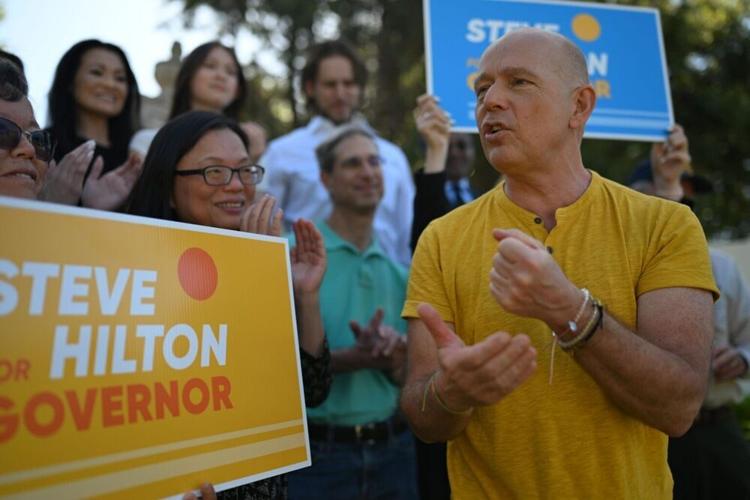
Steven Hilton
ORANGE COUNTY, CALIFORNIA - After the California Supreme Court quickly rejected two Republican petitions seeking a hearing on California Democrats' move to sidestep California's state constitution and redraw the state's congressional districts to help Democrats, Republican gubernatorial candidate Steve Hilton has turned to the federal courts with a legal challenge of his own to the potential new partisan congressional maps.
On Sept. 5, Hilton filed suit in Orange County federal court against California's state legislature and Gov. Gavin Newsom.
In remarks delivered in a video posted to social media, Hilton said he was bringing the lawsuit to "stop Gavin Newsom's grotesque assault on our democracy," and what he called Newsom's "attempt to make a Democratic vote in California worth eight times a Republican vote in California."
"This is obscene," Hilton said. "We're going to try to stop it every way we can."
Hilton is represented in the action by attorneys John W. Howard, Michelle D. Volk and Peter C. Shelling, from the JW Howard law firm, of San Diego; and William R. Barber, of La Mesa.
In the filing, Hilton and his legal team assert that California's mid-decade "emergency" redistricting proposal runs over Californians' constitutional rights to equal protection by redrawing congressional districts without first conducting any kind of census or similar population count to make sure the districts are drawn with equal population, as constitutionally required.
The new proposed congressional map "purports to set district boundaries in a year other than the year following the national census without conducting an update of census counts and population changes, thus creating districts that do not comply with the 'one-man - one-vote' regimen required under the United States Constitution," the lawsuit asserts.
Further, the lawsuit claims the Democrats' proposed new California congressional map also may be racially discriminatory as it "takes no account of the breakup of communities of color and ethnicity, thus diluting the voting power of those affinity groups."
And the new proposed map "violates fundamental fairness and, by its terms, is an exercise in partisan Gerrymandering," the lawsuit states.
The lawsuit lands in court about two weeks since Newsom signed his name to a redistricting plan passed by the California state legislature.
Under the enacted legislative proposal, California Democrats are asking voters in a special referendum election to pass a measure, known as Proposition 50, to approve what is essentially a rapidly enacted amendment to the California state constitution.
Democrats say Prop 50 would "temporarily" allowing state lawmakers to redraw the state's congressional district lines to all but wipe out Republican districts in the state in a naked partisan powerplay, despite a provision in the state's constitution giving that redistricting authority exclusively to an independent commission.

California Gov. Gavin Newsom
Normally, such congressional redistricting is carried out in the opening year of each decade, following the completion of the U.S. Census, to conform congressional districts to population shifts and movement of people among the 50 states and within the state itself in the previous decade.
However, Newsom and his fellow Democrats say the mid-decade redistricting is required in this instance to respond to a similar special redistricting now passed in Texas.
Republicans who lead Texas have similarly said the redistricting is needed to enhance Republicans' chances of maintaining control of the U.S. House of Representatives in 2026.
Newsom and Democrats say they hope to use redistricting in California, the largest U.S. state, will help Democrats balance out the special redistricting in Texas, the second largest U.S. state, and increase Democrats' chances of capturing the U.S. House.
The California redistricting has drawn outrage from Republicans and others in the Golden State, who have particularly noted Democrats' decision to use their raw power to override the constitutionally authorized independent commission in the name of partisan politics.
As Democrats approved the measure, known as ACA8, in August, Republican state lawmakers filed two separate petitions to the California Supreme Court, seeking constitutional review of the proposals, which they say violated the state constitution.
The Democrat-dominated state high court, however, rejected those petitions summarily, without explanation, allowing the measure to continue advancing to voters later this year.
Hilton, who has announced his intent to run for California governor as a Republican, responded with his federal lawsuit, following through on a threat he made early on, when Newsom first announced his intent to toss aside the independent commission and redraw California's congressional district lines to help Democrats.
In his remarks announcing the lawsuit, Hilton said he believed the redistricting and special election - which will cost taxpayers more than $250 million - amount to a "contribution" to Newsom's potential and increasingly likely campaign for U.S. President.
The lawsuit seeks court orders declaring both ACA8 and Prop 50 to be unconstitutional; blocking Prop 50 from the ballot this fall; and blocking the state of California from using the proposed new congressional map during 2026 congressional elections.
No California state officials have yet responded to the lawsuit in court.






